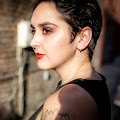Our topic this week: 5 Tips to Build Your Author Platform
To avoid TL;DR, I'll cut that back to 3 tips prefaced by definition `cause thar be confusion about what exactly is an author platform. If you do a Google search, you might believe it's simply your website, which...uhm, no. While having a website is an element of presenting your platform, an author platform is a marketing term for "sell me on you." In this case, you're not selling your book, you're selling your author persona. Author platforms are essential if you're writing non-fiction because you need to prove your expertise and credibility. In non-fiction, your author platform--at a minimum--will present your knowledge base, your bias, and your voice.
IMHO, when it comes to genre fiction, an author platform is way less important. Exceptions exist; however, if you're having a discussion with a marketing professional and they ask about your author platform, don't panic. What they want to know is if there is anything uniquely marketable about you that can sell your book. For example: if you're a rocket scientist IRL who actively discusses aerospace engineering on your socials, and you're writing hard-science sci-fi, then that's a relevant differentiator about you versus other sci-fi authors. It can be used to package you and your books in sales pitches to buyers and in advertising to consumers. It's a bit of a mental gear shift for genre authors whose marketing typically revolves around selling the book (or series) not themselves.
So, what if you're an SFF author who is also a recluse and who eschews social media in all forms? Is it possible to have an author platform? Sure, though without a public persona, you're unlikely to see returns on it. The bare minimum would be a statement in your author bio that establishes your "thing."
Genre writers don't have to be experts in any field, we can be fans or enthusiasts.
As long as we have a passion that presents in our public persona and in our writing, then we can build an author platform. It is very much okay to take time to build your author platform. Yes, new authors might feel pressured by a publisher to have one locked down before debuting, but push back on that. If they bought your book without you having a platform it means they're not relying on your platform to sell it. Author platforms are long-haul marketing investments. Other marketing tools have better yields short term, and professionals know it (so don't let them bully you).
Here are 3 Tips to Build Your SpecFic Author Platform:
- Know Your Stories' Themes: This probably won't be obvious to you until you've drafted (not necessarily published, but at least drafted) a few books. Once you can discern your repeating theme, you've got your "thing" that you can leverage into a topic that you incorporate into your social presence. Is bodily autonomy a repeating theme? Where is the issue being raised in the news, in pop culture, in lesser-known niches? Discuss on your socials. Are there other artists whose works also address your theme? Promote them.
- Share Your Inspirations: Playing fast and loose with mythology in your stories? Does the way of the Fey seep into your world-building? What about cats? Fetishes (of the idol or sexual kind)? What attracted you to those influences? Would you consider yourself a student of those inspirations? Do you continue to read about and/or discuss them? Great! Share your sources, discoveries, and thoughts. Solicit input from other enthusiasts or experts. Be a fan.
- Keep Learning, Keep Leading, Keep Current: Your platform is a living thing. Neglect it, and it loses its value. That includes your interests and themes, both should show your continuous engagement. Being static doesn't help you. It can, in fact, hurt your platform. It's fine if your interests change--personal and professional growth are good things! Make sure to bring your audience along with you on your journey by sharing what attracted you to the new shiny. Did you do a 180 on a formerly held belief because of new information? Great! Share what changed your mind and how it is/will be reflected in your work.










.png)



